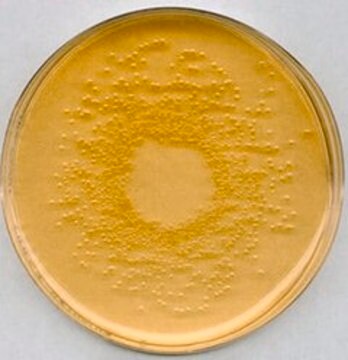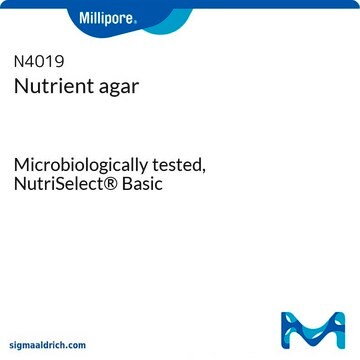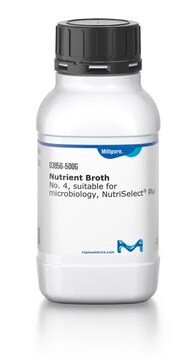70148
Nutrient Agar
suitable for microbiology, NutriSelect® Plus
Synonym(s):
NA, standard nutrient agar
About This Item
Recommended Products
agency
according to ISO 16266:2006
Quality Level
sterility
non-sterile
form
powder
shelf life
limited shelf life, expiry date on the label
composition
agar, 15 g/L
meat extract, 1 g/L
peptone, 5 g/L
sodium chloride, 5 g/L
yeast extract, 2 g/L
manufacturer/tradename
NutriSelect® Plus
technique(s)
microbiological culture: suitable
final pH
7.1±0.2 (25 °C)
application(s)
agriculture
clinical testing
environmental
food and beverages
life science and biopharma
water monitoring
microbiology
Related Categories
General description
Application
- Nutrient Agar is used for the routine cultivation of microorganisms not requiring specific nutritional requirements
- It is also used for the enumeration and enrichment of bacteria
- Nutrient Agar can be used as a base for preparing special culture media.
Preparation Note
Other Notes
Footnote
The designations basic, plus, or prime are added to indicate the quality control level, from basic quality control to standard QC plus to prime for full regulatory compliance.
Legal Information
Storage Class
13 - Non Combustible Solids
wgk_germany
WGK 3
flash_point_f
Not applicable
flash_point_c
Not applicable
ppe
Eyeshields, Gloves, type N95 (US)
Choose from one of the most recent versions:
Already Own This Product?
Find documentation for the products that you have recently purchased in the Document Library.
Customers Also Viewed
Articles
Some Bacillus species are crucial for advancing our understanding of bacteria, while others can be harmful, acting as spoilage organisms or pathogens. Nevertheless, all these species are significant in biotechnological research.
An article concerning the detection, identification, differentiation, and cultivation of Pseudomonas species.
Streptococci- Overview of Detection, Identification, Differentiation and Cultivation Techniques
Our team of scientists has experience in all areas of research including Life Science, Material Science, Chemical Synthesis, Chromatography, Analytical and many others.
Contact Technical Service








